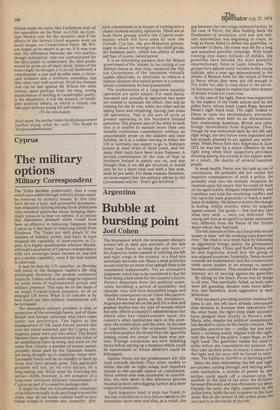Cyprus
The military options
Military Correspondent
The Turks decided, predictably, that a coup which succeeded through military means must be removed by military means. In this they have shown a logic and purposeful determination singularly lacking among those politicians who mouthed platitudes about bringing diplomatic pressure to bear on Athens. It is certain that diplomatic pressure alone would have been as effective in removing Sampson from Cyprus as it has been in removing Smith from Rhodesia. The Turks are well aware of the realities of military power, and have at least retained the capability of intervention in Cyprus. It is highly questionable whether Britain, although a guarantor of Cyprus's independence with two sovereign bases thrown in, has still got a similar capability, even if she had wished to intervene.
It may be that the UN ceasefire on Monday will result in the Sampson regime's life bing prolonged. However, the present unilaterial action by Turkey will at some stage be replaced by some form of multinational action and military presence. This may be ori the basis of an Anglo-Turkish-Greek presence, or of an enlarged UN force, What is of concern is by how much our own military commitment will be increased. The immediate military problem is that of protection of the sovereign bases, and of those British and foreign nationals who have come under our protection. The lights at the headquarters of UK Land Forces burned late over the whole weekend, and the Cyprus contingency plans were put into effect. The Royal Marines have again demonstrated the value of an amphibious force in being and were on the scene first. Clearly, a number of transit camps, probably those used by the Ugandan Asians, are being brought up to readiness. Other reinforcement forces will be on standby to back up those that have already gone. This particular problem will not, by its very nature, be a long-lasting one. What must be worrying the service chiefs, however, is the prospect of a long-term increased miliatary commitment in Cyprus as part of a ceasefire package deal.
It might be that the Government, conscious of its failure actually to do anything to avert the crisis, may all too easily commit itself to providing troops to oversee any ceasefire. Any
such commitment is in danger of turning into a classic internal security operation. There are at least three groups within the Cypriot community which will have arms by now: the Turkish Cyp-iots, the pro-Makarios groups, eager no douut for revenge on the third group, the Sampson party, which has plenty of arms and has, of course, tasted power.
It is an interesting paradox that the Wilson government of the 'sixties, by its cutting of our defence forces at that time, rendered the Wilson Government of the 'seventies virtually unable effectively to intervene to remove a military dictator who seized power in a country whose constitution we had guaranteed.
The mathematics of a long-term security operation are quite simple. For each battalion-sized unit actually in operation two more are needed to maintain the effort. One will be training for the IS role, while the other will be taking leave and retraining, having just come off operations. This is the sort of cycle at present operating in the Northern Ireland operation. The present size of the army is such that it is unable to sustain more than one sizeable continuous commitment without an unacceptable strain on the soldiers and their families. As it is, a soldier serving in either the UK or Germany can expect to go to Northern Ireland at least twice in three years, and for many their tours have been more frequent. A second , commitment of the size of that in Northern Ireland is simply not on, and any thought that, if we did get involved, it would only be for a short time and with a few men, must be put aside. For these reasons therefore, we must expect that the military advice to the Government will be: "Don't get involved."



























 Previous page
Previous page